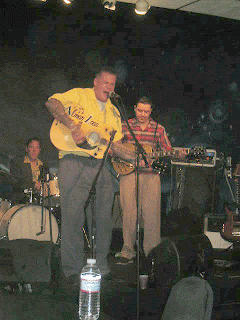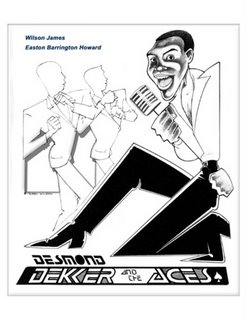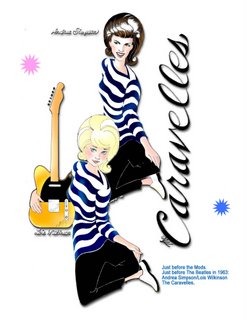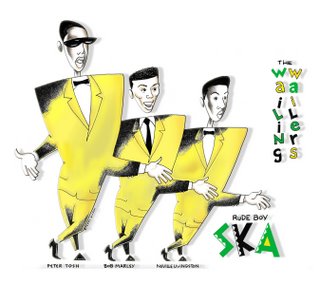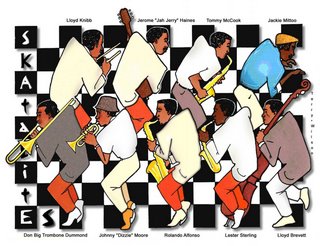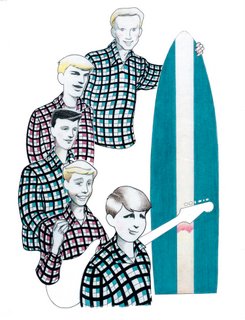Of course no collection of cars, not matter what fancy gagets is has, is complete without a Ford Thunderbird; simply is not possible. In the 1950s and '60s a golden age of hotrod and kustom kulture thrived in Southern California. While I had posters of Sandy Koufax and Don Drisedale on my bedroom wall. I also had pictures of Mickie Thompson, A.J. Foyt, and Parnelli Jones. Robert Williams and Ed Roth were favorite artists and still are. Black, White, and Brown were enamored with kustom kulture.
Monday, November 25, 2013
Cars and Guitars in Southern California including Glendale.
Of course no collection of cars, not matter what fancy gagets is has, is complete without a Ford Thunderbird; simply is not possible. In the 1950s and '60s a golden age of hotrod and kustom kulture thrived in Southern California. While I had posters of Sandy Koufax and Don Drisedale on my bedroom wall. I also had pictures of Mickie Thompson, A.J. Foyt, and Parnelli Jones. Robert Williams and Ed Roth were favorite artists and still are. Black, White, and Brown were enamored with kustom kulture.
Sunday, November 24, 2013
Just Like Eddie Cochran
 |
| Big Sandy at the Bordello in Los Angeles |
 |
| One of the best and clearest singers live, that I have ever heard! |
 |
| Levi Dexter at the Cochran Club |
 |
| Little Mo! |
He came into the studio ready. Well versed in the current technology of the times as well and was a guitarist of extraordinary skill and talent: he could play anything. After maybe three listenings any style he heard, he could play. He was poised to be the first guitar hero and even Jimi Hendrix requested that his music be played at his funeral; request granted.
Regarding his terrible death he was one of the last real rockers standing during the teen-idol era who refused to do that. He had the looks. He had it all but the orientation to do that and even ducked out on Ed Sullivan to preserve his rocker image! Hollywood might have used him more and being at the epicenter of the rock instrumental culture coming, no doubt he would have flourished even more. In fact a number of the surf bands were very influenced by Eddie Cochran in at least two ways 1. his sense of humor, and 2. Ray Charles music. And he could play! Very affable chap.
A committed Gretch player, his friend and fellow guitarist Dick Dale, would discuss where they believed guitar was going. Dick was a solid body player and reasoned that speed, playing technique, and the studio were going to be instrumental; and he was correct. Remember Dick Dale has country and western roots as well.
Recently in Bell Gardens, the Cochran Club was opened. I was there for the christening and took the following pictures.
 |
| Raphael the artist |
 |
| Blue Denim |
 |
| Bobby Cochran |
Some of the entertainers included Blue Denim, Levi Dexter http://www.punkglobe.com/levidexterinterview0610.html, Little Mo...
 |
| Blue Demin from Sydney Australia.http://www.reverbnation.com/bluedenim |
Rock-a-billy music http://www.mp3rockabilly.com/, orignally just called rock and roll even in the south, his a strong hear in the Los Angeles area. Ask John Fogerty. Overseas and up in Canada, when the American in American music was finally strangled within the corporate-intelligence culture comprising Top 40 and so on and Alex Constantine's book: The Covert War Against Rock and Rebels of the Air by Jessie Walker http://reason.com/people/jesse-walker/articles and Fighting for Air by: Eric Klinenberg https://www.adbusters.org/magazine/72/Fighting_For_Air_An_interview_with_Eric_Klinenberg.html are indispensable to an understanding of this.
American music flourished! What was the end stateside, were the beginnings elsewhere. Cliff Richard and The Shadows ruled in England http://www.cliffrichard.org/, Johnny Halliday in France where he is still much beloved today and has had the great talents of Brian Setzer http://www.briansetzer.com/ playing with him recently as well https://www.facebook.com/Fan.Club.Johnny.Hallyday. These and a number of others remain not well known in the USA but should be! I find European rock-a-billy, not the chart music ones hears on some Top 40 Oldies station, much more interesting. I call it solid-state rock and roll because it sound as though no tube speakers were used, or seldom use. They are hard on themselves! Very critical at times with the music because it is not exactly like Buddy Holly or Chuck Berry http://chuckberry.com/, tell me who is?
In Canada rock-a-billy continued well into the 1960s. There is an annoying pattern. It is when elements within America starves its people at home but enriches what often turns out to be competitors or future enemies abroad.
Wednesday, August 29, 2012
Rock Instrumentality and Huntington Beach
Without people like George Tumsco of New Mexico's Fireballs, rock music in its current form, would be different. Mr. Tumsco's band is essentially the first with the classic rock instrumental line-up of two guitars, bass, and drum with the star lead dominant in Duane Eddy and Link Wray. In 1958 the Fireballs started lighting up New Mexico with their instrumentals. Tumsco even met Buddy Holly himself who, without asking, took his Fender Stratocaster, plugged in, tuned up and played Margaya.
Here he is in a recent picture. One of these days I hope I am aware of his Southern California appearance and attend a show. The Fireballs signature instrumentals: Bulldog, Torquay, and Rik-a-Tik are fondly remembered by me. When I first heard them in Los Angeles the year was 1960. An era which did not just promote singers as radio and most television now does. The best way for me, has been to see and hear such entertainers live.
Huntington Beach Pier is one of the best. Walk down the streets near the pier and one see foot prints of surfers. A museum dedicated to the sport and culture, including the music, is near-by and as one who well remembered the early 1960s music and television on KHJ channel 9 and KCOP 13, it is great to see this important contribution getting at least some recognition without D.C. dictating to it. Gotta be few surfers among congressmen and senators, I hope.
Slacktone is a trio of veteran musicians that have been playing at a professional level since they were still lads. No instrumental combos sounds like Slacktone.Their playing has syllables and no one else does. It's unique. Surf based, yet much more and, unfortunately, not honored in Los Angeles like is ought to be.
Huntington Beach has is correct by not only honoring surfing culture but surfing music as well; that instrumental sound that came out of Southern California around 1958, according to Dick Dale, and really began to flourish in 1962 and 1963 only to be decapitated by the UK bands such as The Beatles. One band, The Yardbirds, found So. Cal one of their most successful touring spots and still return here for gigs.
The music was evolving. A rather simple, spring of 1962 tune like Paradise Cove by the Surfmen was not as sophisticated as the fall of 1962 Pipeline by the Chantays, or Ghost Wave by the Vistas in 1963. Skip ahead and The Fender IV, and Davie Allan are pushing the music even further in 1964 and '65. No help from the English was required.
The Reventlos are one of the best and most progressive rock instrumental acts on the scene today. These two pictures were taken as they performed fan favorite Reventlo Hayride an hard rock, psycho-billy number recorded in 1996 yet remains as popular today. You wanna test your chops? learn this number!
It's one to hear it on a CD and quite another to hear live it and up close. The fire is their own.
When he was guest on the 870 Am KIEV Ray Briem radio show, I spoke in 2000, to the great musician and inventor Les Paul. We spoke about instrumental music and he considered them merely "filler". I disagreed since so many hits in the 1930s-1960s were instrumentals that stand the tests of time.
I see the demise of the instrumental akin to the overhauling of radio in favor of television: radio's theater of the mind is interpreted individually while television, with its explicit images and words, can be more easily programmed for mass influence. So vocals with exact words are better for consensus and control of listeners. With the establishment of a security state and Top 40 being founded, in part, by a former OSS man (see The Covert War Against Rock)it makes sense to use music as sort of a opiate or distraction. And this is one of the reasons I prefer instrumental music to vocals.
Much kudos to Bob Dylan for his writing of topical lyrics. Instrumental music, to me, was just as relevant. Tunes like "Fidel Castro", by Roland Alphonso, "Christine Keeler", "Malcom X",by the Skatalites, "Sniper", by The Royal Flairs,or "Tel Star" by the Tornados do not have words but their titles were very timely and expressed ideas words might have fallen short on and possibly not even allowed on commercial radio. In this regard they are akin to abstract paintings which, in some cases, were done to express ideas with no literal interpretation.
Paul Johnson was there when Southern California rock instrumental music was born. With his band the Bel-Aires he and Eddie Bertram, established what Lance Carson called, in 1961, 'surfin' music!' which he wanted to hear some more of. Their signature number Mr.Moto has been performed by instrumental bands for years and will be as long as Fender guitars are still being made and played.
Gil Orr and he form the Duo-Tones and perform in and around Los Angeles. Both are men of Christian faith and this has affected their music as well.Sunday, May 23, 2010
Go-Geters sweet out of Sweden


When Big Sandy pointed out Peter of the Swedish rock-a-billy trio The Go-Getters, I knew he was not there to merely be a tourist. For years I hoped to see his combo and checked the internet. Sure enow, there was an upcoming show at the Knitting Factory in Hollywood.
They were not the headlining act. But they were the one that I made the most effort to hear and see. I was not disappointed.
Afterwards, when I spoke with him, he told that the EU had not made the radio in Europe better for diversity but worse for the home bands like his. An odd thing, but not too unlike what has happened in the USA. If commercial radio was truly free in its boasting about how adventurous it is, The Go-Getters would have been spun on it by now.
Monday, May 17, 2010
California Surf Music Culture at the Autry


Once upon a time rock instrumental music was heard on Los Angeles radio. The Chantays, Pyramids, Johnny Fortune, Dick Dale could actually be heard and have to utter a word of romantic love, or being saved from a dung heap by some benevolent girl. The waves, hotrods, and pretty girl were and remain a part of the instrumental surf music and Lloyd Davis of Longboard Ranch is a testament to the longevity of surf music.
Once upon a time he played bass for Bob Dalley's Surf Raiders. Now his second lead and rhythm for Longboard Ranch a find surf band that also respects England's The Shadows who recorded the famous instrumental Apache in 1960.
It has bee proven to me more than thrice, that once people hear good rock instrumental surf or just rock instrumentals like The Shadows or Jams Wilsey, they cotton to it! Radio, if you interested in giving people what they want, then surf music is one of those essentials. Otherwise the exodus to the internet will continue and commercial radio refugees increase.
Tuesday, April 27, 2010
Long Live Laika and the Cosmonauts


It was on the great show Surfwave that Laika and the Cosmonauts were heard in Los Angeles. The year was about 1990. As the radio show ended the august sounds of Fade-A-Way were heard but there was no back announcement.
By next week host, Jim Dunfrund, had been besieged with requests about this mystery melody. After some checking he told us that it was "Laika and the Cosmonauts from Finland...". Laika, as you may recall, was the name of the dog sent into space by the Russians in the 1950s.
The Warehouse on Santa Monica had one man that favored rock instrumentals, it was he that sold me my first CD of the Cosmonauts. What I next needed was a CD player. Surfwave was THE show that got me buying them before I even had a player! I listened to the show from 1979-2003 and still lament its loss. But the host found greener pastures in San Francisco.
It took me years to see them since I worked evenings. Finally seeing them in Hollywood at the Knitting Factory then again during their farewell tour at the Bordello with Big Sandy. They signed my records and allowed me to take pictures. Sorry they were not played more. They like another European act, told me that the EU has not bettered radio coverage for European bands.
I hope what followed their demise is better for them. Musically it remains worse for us.
Monday, April 26, 2010
Billy on Hollywood Hilly


Anyone that knows the history of rock-a-billy "White man's blues" according to some, know of the great respect it has long had in Canada, Europe, or Asia (Japan). This continues to this very day.
Sweden's Go-Getters are one of the premier practitioners of this form of music. With the establishment of the EU one would imagine a better programming of radio. Their drummer and leader told me this is not the case. In fact it has gotten harder for Peter and the boys to get airplay at home since the EU was established!
It remains a vitals, fun, and vigorous style of music yet country and rock radio shun it or regard it as an 'oldies' idiom. Psychobilly, rooted in the Cramps and maybe, for pace The Ramrods and their take on Ghost Riders in the Sky (by Stan Jones), cab be more topical than most commercial music other than rap or hip hop.
Wednesday, April 21, 2010
Jeff Beck at Nokia



Some may bristle at the thought of Jeff Beck being as skilled as Hendrix, but I am not among them. Between the Clapton and Hendrix explosions it was Jeff Beck while still in the Yardbirds and Hendrix was well enough of aware of him to ask Chas Chandler if he could meet him in 1966.
Not as overt musically as Hendrix, be as adroit, he was doing as a Yardbirds what Hendrix would later do but could not as a sideman on the Chitlin' circuit. Unfortunately Jimi is not here in the flesh.
Jeff Beck remains a musical adventurer and that seeking to break the sound barrier again led him to the instrumentals.
Monday, February 22, 2010
Robert Williams: art hero

The first time I recall seeing the art of Robert Williams Lyndon Johnson was President.
It was in a magazine about custom cars and drag racing during its height in So. Cal: the 1960s. His work with Ed Roth is immortal!
During those years I was very much taken with stock cars, drag racing, skate and surfboarding, and even custom bikes and off road riding before they became as institutionalized as they are now.
Leaders among that culture visually were men like Robert Williams, Rick Griffin, Stanley Mouse, or Robert Crumb...But the monstrosities of Williams had me so stoked, I attempted a number of copies for my grammar school sketch book.
He's reaching new heights now as a sculpture and is showing at the CSUN art gallery. Be there or be normal!
Here he is seen with storyboard artist and old mate Paul Power at the gallery today.
Monday, August 17, 2009
Commitment to Cartooning
At age ten, I finally decided to become a cartoonist. But now, at age 51, I am committing to do this as a way to make my niche in society having bailed out too many times and regretted it badly!
So, after getting laid off from Disney ARL (A great place for me to work) earlier this year, a concerted effort to bring my cartoon vision to the world, via the Internet, was launched and named Topic Toons.












